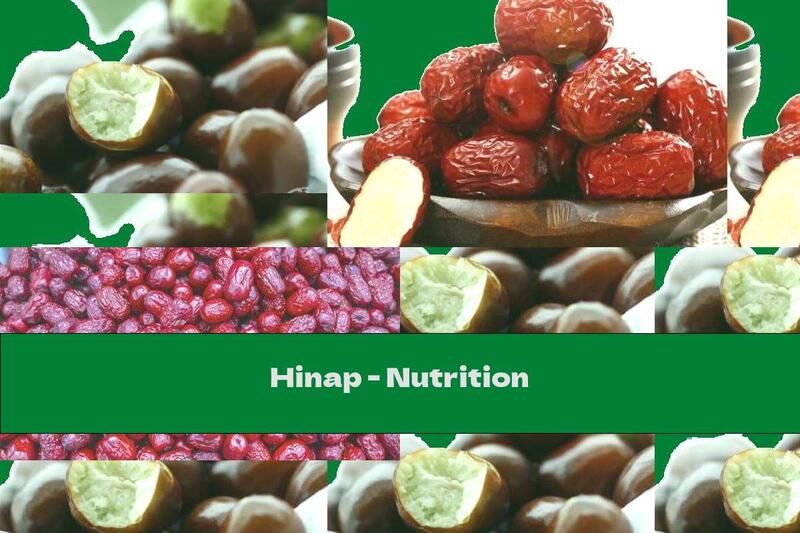Hinap - Nutrition
 Author: Joe Fowler
Time for reading: ~3
minutes
Last Updated:
August 08, 2022
Author: Joe Fowler
Time for reading: ~3
minutes
Last Updated:
August 08, 2022

CHAPTERS (Table Of Contents)
In this article, learn more about Hinap - Nutrition. Juniper - nutritional value, health benefits and safety profile.
Juniper , also known as Chinese red date, grows in natural and cultivated gardens in Korea, Japan and a number of regions in eastern Asia. It has also adapted in some parts of the Black Sea and the Mediterranean. Due to the taste and a number of health benefits for the human body, jujube is also grown in artificial plantations.
Dried fruit has a similar taste and nutritional profile as dates, as it provides the body with energy, minerals and vital vitamins.
Botanically it belongs to Rhamnaceae, the family of flowering plants, and its scientific name is Ziziphus jujuba.
Juniper is a small to medium-sized deciduous tree, reaching 5-7 meters in height. Its branches are strongly branched and covered with sharp thorns. It is drought resistant and grows well, even in poor soil conditions.
In early summer, jujube flowers are light green to white and cover the entire crown of the tree. The fruits have juicy white flesh and a hard stone located in the center. Their size varies from 3 to 6 centimeters in diameter, and the shape can be oval, flattened, round or cylindrical. The flesh of the fruit is crispy and slightly astringent, resembling that of an apple. When it dries on the wood, its color changes from light green to red or brown. The surface of ripe fruits is wrinkled as in dates. You can enjoy the fruits even when they are crispy and light green or wait for them to become dry and red.
Health benefits
Juniper, fresh or dried, contains a number of essential nutrients, vitamins and minerals that are necessary for normal growth, development and good general condition of the body.
While fresh jujube is rich in vitamins and fiber, dried red fruits are high in calories, but also a rich source of vitamins and minerals.
The fruits contain tannins, which have anti-infective, anti-inflammatory and anti-hemorrhagic properties.
Fresh jujube is an excellent source of vitamin C - about 69 milligrams per 100 grams or 115% of the recommended daily intake. Vitamin C is one of the powerful water-soluble antioxidants that help remove harmful free radicals from the body. It also stimulates the synthesis of connective tissue and thus accelerates wound healing.
Dry jujube is an excellent source of calcium and iron. Calcium is an important mineral that builds teeth and bones. It is also responsible for muscle contraction, blood clotting and nerve impulse conduction. Iron, as a component of red blood cells, determines the blood's ability to carry oxygen.
Both fresh and dried fruits contain a moderate amount of B vitamins. Dry jujube provides the body with significant amounts of pyridoxine, thiamine, niacin, pantothenic acid and riboflavin. These vitamins act as cofactors and support the metabolism of carbohydrates, proteins and fats.
Medicinal uses
Dried jujube fruit is an integral part of traditional Chinese medicine and has been used successfully for nervousness, infections and digestive problems.
Selection and storage
Fresh jujube fruits are distributed from July to November. After harvesting, they are divided according to the degree of ripening and their size. They can be dried in the sun or in specially designed machines. Dried fruits can be consumed as such or used to make juice, wine, powdered, etc.
If you want to enjoy fresh and crunchy fruits, look for hard and light green jujube. They last up to 3-4 days at room temperature and up to several weeks in the refrigerator.
Dried fruits can be stored for months.
Culinary use
- Fresh jujube can be eaten as an apple.
- Dried fruits can be eaten directly or included in recipes for cakes, bread or other culinary delights.
- Aromatic and refreshing, jujube tea also provides a number of health benefits to the human body.
- Dried jujube can be used to make jams and marmalades.
Safety profile
Juniper berries can be consumed by everyone, including pregnant women and young children.
Related Articles
- The Ultimate Guide to Hickory Smoked Bacon in Nutrition and Healthy Eating
- Fruitskewers in Honey Syrup: Nutritional Benefits and Recipes
- The Ultimate Guide to Buffer 500 in Nutrition: Benefits and Usage
- Nutritional Benefits of Fruit Skewers in Honey Syrup: A Delicious and Healthy Recipe
- Nutrition Guide: Fruitskewers in Honey Syrup - Benefits, Recipes, and More